|
|
|
Sort Order |
|
|
|
Items / Page
|
|
|
|
|
|
|
| Srl | Item |
| 1 |
ID:
159347
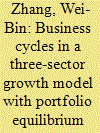

|
|
|
|
|
| Summary/Abstract |
This study generalises a growth model proposed by Zhang (2016) through allowing all the time-dependent variables to be time-dependent. Zhang’s model deals with dynamic interdependence between capital accumulation and environmental change, with portfolio equilibrium among land, gold and physical wealth in a multi-sector general equilibrium framework. The model explains the dynamics of prices, rents and distribution of land, gold, physical wealth and environmental change on the basis of micro-economic foundation. This article generalises the model to explain business cycles due to different exogenous shocks. We simulate the motion of the economy and conduct comparative dynamic analysis to demonstrate business cycles due to periodic oscillations in the propensity to use gold, the propensity to consume housing, the propensity to consume industrial goods, the propensity to consume agricultural goods, the propensity to save, and the tax rate on the consumption of industrial goods.
|
|
|
|
|
|
|
|
|
|
|
|
|
|
|
|
| 2 |
ID:
170216


|
|
|
|
|
| Summary/Abstract |
We estimated a stochastic growth model for Sri Lanka over the 1962–2015 period and found that permanent productivity shocks constituted the largest proportion of the variance in output growth. We computed correlation coefficients between permanent productivity shocks and some variables and found a negative correlation between the shocks and the growth in migration outflows. The findings are consistent with the negative effect of civil war on economic growth from an exodus of skilled workers. We further investigated the factors that drive migration from Sri Lanka to a major migration destination, namely Australia, for educated and skilled Sri Lankans. We regressed the growth rate of the Sri Lankan-born population in Australia on a civil war dummy variable, per worker Australian gross domestic product (GDP), adjusted for the restrictiveness of Australian immigration policy and an estimated labour wedge that represents labour market inefficiency in Sri Lanka. We found that Sri Lankan immigrants in Australia increased with per worker GDP in Australia, civil war and labour market inefficiency in Sri Lanka. The finding suggests that excessive protection of insiders in the Sri Lankan labour market should be abolished to mitigate migration outflows that have continued since the end of the civil war.
|
|
|
|
|
|
|
|
|
|
|
|
|
|
|
|
| 3 |
ID:
040427
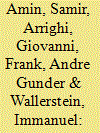

|
|
|
|
|
| Publication |
New York, Monthly Review Press, 1982.
|
| Description |
248p.
|
| Standard Number |
0853456054
|
|
|
|
|
|
|
|
|
|
|
|
Copies: C:1/I:0,R:0,Q:0
Circulation
| Accession# | Call# | Current Location | Status | Policy | Location |
| 021931 | 303.9048/AMI 021931 | Main | On Shelf | General | |
|
|
|
|
| 4 |
ID:
143693
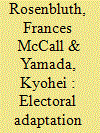

|
|
|
|
|
| Summary/Abstract |
Japan’s conservative Liberal Democratic Party swept both houses of parliament in December 2012 and July 2013 on a platform of Keynesian spending. Better known for fiscal stringency, the LDP “changed its spots” in part because 1994 electoral reforms force parties to compete on party platforms in place of clientelism.
|
|
|
|
|
|
|
|
|
|
|
|
|
|
|
|
| 5 |
ID:
124546
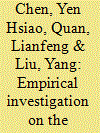

|
|
|
|
|
| Publication |
2013.
|
| Summary/Abstract |
This paper employs a structural time series model designed with three components of stochastic seasonality, trigonometric expression of cyclicality and local linear trend to investigate the evolutionary process of China's GDP. In particular, the model is able to detect the stop-go feature of China's economic growth, i.e., growth cycle, as well as business cycle. The empirical result suggests that most variation in China's macroeconomic performance came from business cycle. The investigation of the three components along with historical events suggests that the Chinese economy had been largely influenced by political activities up to the early 1990s. In the mid-1990s China entered a period of stable and highly growing economy, thanks to the economic reform and the successful implementation of macroeconomic policies. However, since the mid-2000s China has become more sensitive to the turbulences in international markets. In the foreseeable future, the challenge facing China is a more volatile economy with possible slowdown in the economic growth, although the growth rate would still be high compared to developed economies.
|
|
|
|
|
|
|
|
|
|
|
|
|
|
|
|
| 6 |
ID:
083236
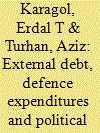

|
|
|
|
|
| Publication |
2008.
|
| Summary/Abstract |
This paper investigates the relationship between external debt, defence expenditures and political business cycles in Turkey for 1960-2002. Here, two important aspects of the political business cycle, the electoral effects and the partisan effects, were investigated. The empirical finding of impulse response functions of defence expenditures to a shock in the partisan effect is positive. The results reported here indicate that political colours of parties appear to be important. This suggests that defence expenditure is influenced by political ideology and the fiscal policy of governments after elections. Moreover, the impulse response functions of external debt stock to shocks to the electoral effects and the response of external debt stock shocks to the partisan effects increased over the whole period.
|
|
|
|
|
|
|
|
|
|
|
|
|
|
|
|
| 7 |
ID:
048337
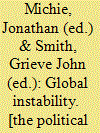

|
|
|
|
|
| Publication |
London, Routledge, 1999.
|
| Description |
x, 260p.
|
| Standard Number |
0415202221
|
|
|
|
|
|
|
|
|
|
|
|
Copies: C:1/I:0,R:0,Q:0
Circulation
| Accession# | Call# | Current Location | Status | Policy | Location |
| 041390 | 332.042/MIC 041390 | Main | On Shelf | General | |
|
|
|
|
| 8 |
ID:
122456


|
|
|
|
|
| Publication |
2013.
|
| Summary/Abstract |
This article analyses the effects of government expenditures on German business cycle fluctuations by means of an estimated DSGE model based on low frequency oscillations. The results highlight that fiscal policy has a strong impact on the amplitude of fluctuations while hardly any on the duration of business cycles. To the extent that fiscal policy shocks are an important source for triggering economy-wide fluctuations, fiscal policy also strongly reacts to shocks originating elsewhere. Thus standard specifications of government expenditures in terms of simple AR(1) processes ignore the fact that there can indeed be a strong dependence of governmental variables on economic fluctuations.
|
|
|
|
|
|
|
|
|
|
|
|
|
|
|
|
| 9 |
ID:
041084


|
|
|
|
|
| Publication |
New York, Pergamon Press, 1980.
|
| Description |
viii, 493p.Hardbound
|
| Standard Number |
0090251021
|
|
|
|
|
|
|
|
|
|
|
|
Copies: C:1/I:0,R:0,Q:0
Circulation
| Accession# | Call# | Current Location | Status | Policy | Location |
| 019877 | 382.10947/NEU 019877 | Main | On Shelf | General | |
|
|
|
|
| 10 |
ID:
076001


|
|
|
|
|
| Publication |
New York, Palgrave Macmillan, 2007.
|
| Description |
x,242p.
|
| Standard Number |
1403975795
|
|
|
|
|
|
|
|
|
|
|
|
Copies: C:1/I:0,R:0,Q:0
Circulation
| Accession# | Call# | Current Location | Status | Policy | Location |
| 052210 | 330.0511/BAT 052210 | Main | On Shelf | General | |
|
|
|
|
| 11 |
ID:
146014
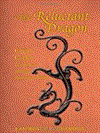

|
|
|
|
|
| Publication |
Seattle, University of Washington Press, 2014.
|
| Description |
xii, 355p.pbk
|
| Series |
Studies of the East Asian Institute
|
| Standard Number |
9780295993768
|
|
|
|
|
|
|
|
|
|
|
|
Copies: C:1/I:0,R:0,Q:0
Circulation
| Accession# | Call# | Current Location | Status | Policy | Location |
| 058722 | 337.51/REA 058722 | Main | On Shelf | General | |
|
|
|
|
|
|
|
|
|